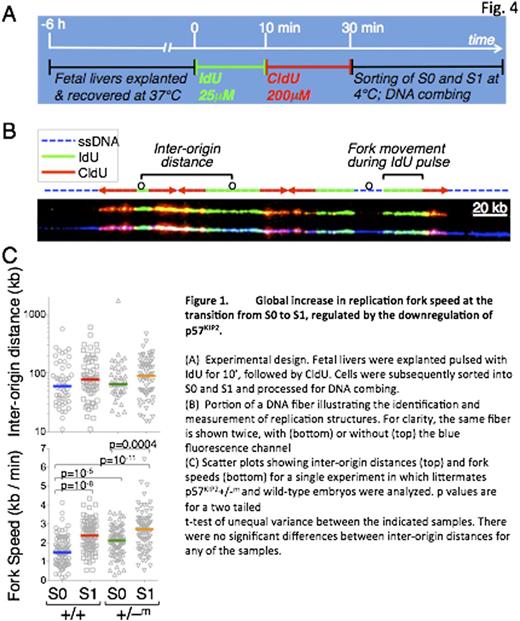Abstract
Cell cycle regulators are increasingly implicated in cell fate decisions such as the acquisition or loss of pluripotency and self-renewal potential. The cell cycle mechanisms that regulate these cell fate decisions are largely unknown. Here we studied an S phase- dependent cell fate switch in the erythroid fetal liver, in which murine early erythroid progenitors transition in vivo from a self-renewal state into a phase of active erythroid gene transcription and concurrent maturational cell divisions. In the fetal liver, this transition corresponds to the transition from subset S0 (CD71-low, Ter119-negative) to subset S1 (CD71-high, Ter119-negative). We found that the S0 to S1 transition takes place during an S phase that is abruptly shorter (decreasing from 7 hours to 4 hours). Further, self-renewing S0 cells uniquely express the cyclin-dependent kinase (CDK) inhibitor p57KIP2 during S phase. To investigate its potential role, we studied DNA replication in vitro and in vivo in p57KIP2 -deficient fetal liver progenitors, employing a variety of techniques, including DNA combing. We found that S0 erythroid progenitors are dependent on p57KIP2-mediated slowing of replication forks for self-renewal, either in vivo, or in dexamethasone-dependent expansion cultures in vitro. The switch from self-renewal in S0 to differentiation in wild-type S1 progenitors entails rapid downregulation of p57KIP2 with a consequent global increase in replication fork speed and an abruptly shorter S phase. In the absence of p57KIP2, replication fork processivity increases prematurely in self-renewing S0 cells, prior to the activation of the erythroid transcriptional program (Figure 1), resulting in replicative stress and cell death.
It is well established that differentiation leads to reprogramming of DNA replication, reflected by changes to origin usage and to the timing of replication of chromatin domains. Here we find that the replication program is fundamentally altered in additional key respects: the global processivity of replication forks, regulated by CDK activity, increases abruptly with the switch from self-renewal to differentiation, affecting DNA synthesis rates and S phase duration. Our results are also of interest since the regulation of replication kinetics was thought to be primarily via the regulation of origin firing efficiency, rather than via fork processivity. Here we found no difference in the former (there was no significant change in inter-origin distances, Figure 1). While the full significance of faster forks to the activation of the erythroid transcriptional program is yet to be understood, a recent report found that T cell help leads to faster forks and a shorter S phase in B cells (Gitlin et al., Science 349, 643-646 2015). Regulation of global fork speed may therefore be an intrinsic part of physiological developmental programs.
No relevant conflicts of interest to declare.
Author notes
Asterisk with author names denotes non-ASH members.


This feature is available to Subscribers Only
Sign In or Create an Account Close Modal